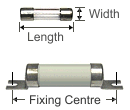Fuse Finder: Find the Replacement Fuse you need
Use our Fuse Finder to find the right replacement fuse. Whether you need a new fuse for your vehicle, home fuse box, electronics or home appliance our fuse finder can help.
Search by Fuse Speed, Voltage Type, Voltage Rating and/or Ampere Rating and we’ll show the right fuse to use.
Help on Using the Fuse Finder
What is Fuse Speed?
Fuses are designed to react to an overload within a pre-determined time frame. This is known as the speed of the fuse. The Fuse Finder tool allows you to search for fuses using 3 different speeds (slow acting, fast acting and ultra rapid). The majority of fuses have markings on the cap, body or label to help identify the speed of the fuse.
Resettable fuses are designed to protect a circuit from fault currents by generating a high level of electrical resistance to stop current flowing through the circuit until the fault is fixed, then the device will reset itself. Learn more about resettable fuses.
What is Voltage Type?
Whilst the majority of fuses are designed for use with AC (alternating current) voltages, there are a growing number that are designed for use with DC (direct current) voltages. When selecting a fuse, it is important to know the type of voltage operating in the circuit. Whilst many fuses only have either a VAC or VDC rating, some fuses have a voltage AC and DC rating.
Regardless of the voltage type (AC or DC), the fuse must have a voltage rating equal to or higher than the maximum operating voltage in the circuit as explained in the Voltage Rating section below.
Important: To ensure proper protection of your circuit, only use a fuse that is rated for the type of voltage operating in the circuit.
What is Voltage Rating?
The voltage rating of a fuse is specified as the maximum operating voltage. This means the fuse can be used in a circuit operating at any voltage up to the maximum voltage specified.
For example; if your fuse was rated at 250VAC, it could be used in a 250VAC circuit or in lower voltage circuits such as 125VAC or 12VAC, but it must NOT be used in a circuit operating above 250VAC ie. you couldn't use it in a 300VAC circuit.
It is not uncommon for fuse voltage ratings to vary within the same product range. ie. a 5 Amp 3AG fuse may be rated at 250VAC, but a 20 Amp 3AG fuse may only be rated at 32VAC. Therefore, be sure to check the product sheet carefully before you order the fuse.
What is Ampere Rating?
The ampere rating of a fuse specifies the current carrying capacity. When a fuse is subjected to a current at or above its ampere rating, it will open the circuit after a predetermined period of time. This time interval is based on the element speed of the fuse.
It is recommended the replacement fuse should have the same ampere rating as the original fuse. When replacing ultra rapid fuses which are designed to protect high-speed semiconductor components, the ampere rating is of lesser importance to the I²t rating of the fuse element.
Important: We do not recommend that you replace an existing fuse with a higher ampere rating as you may risk damaging your equipment should a fault occur.




